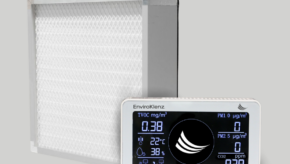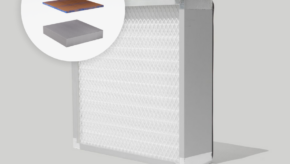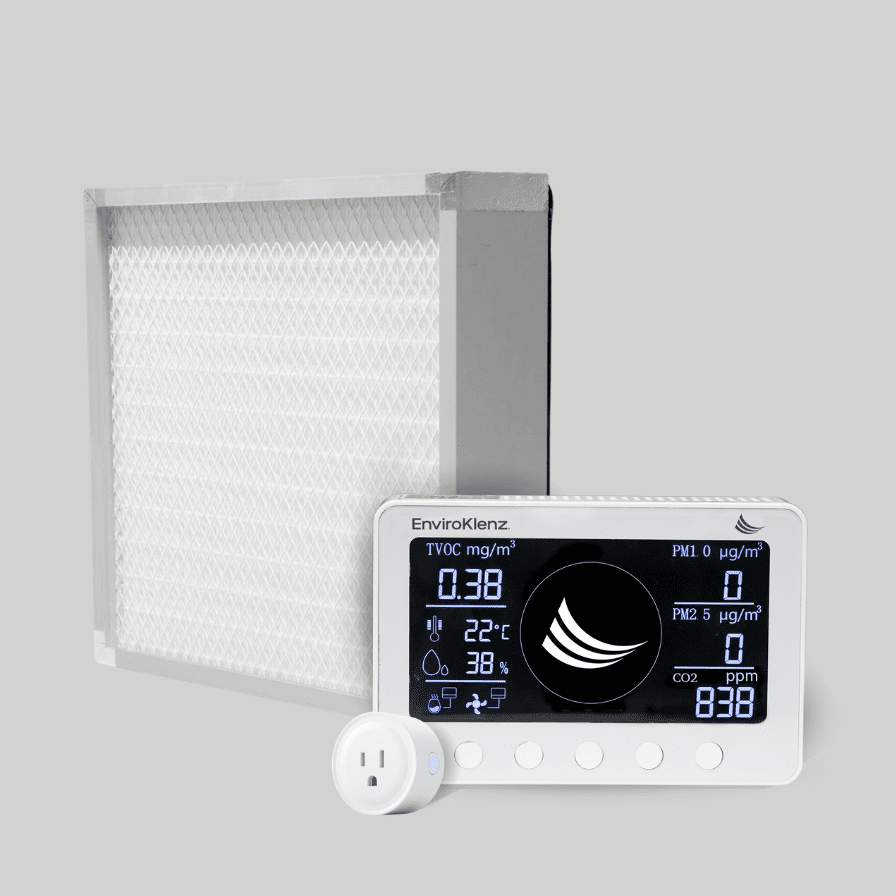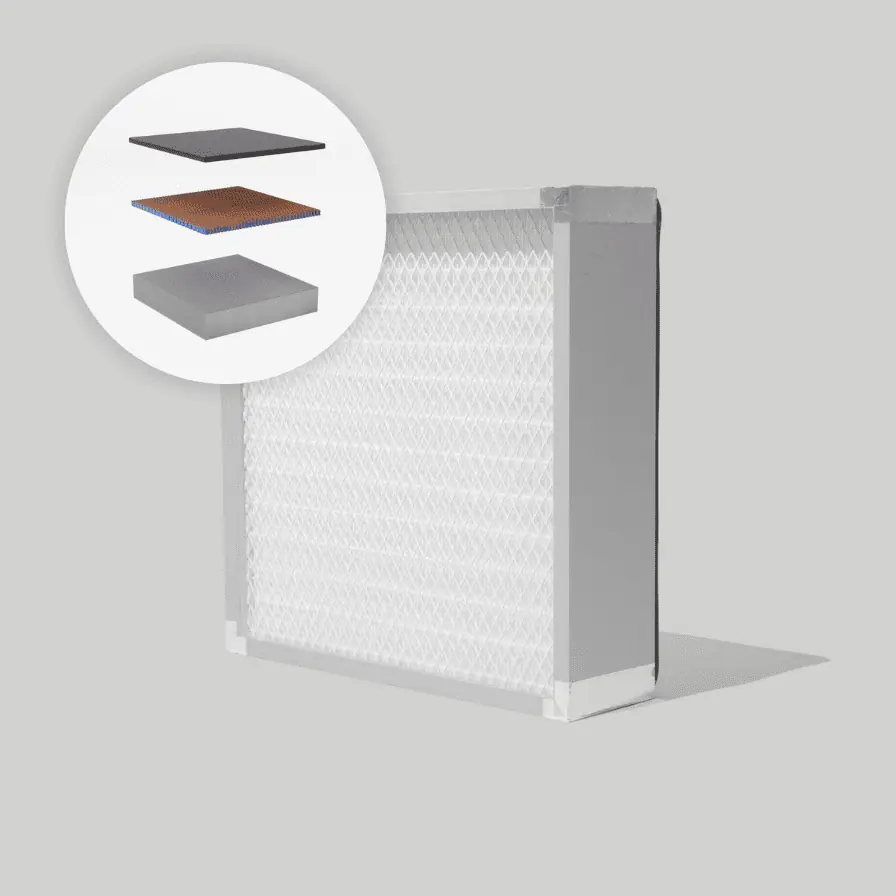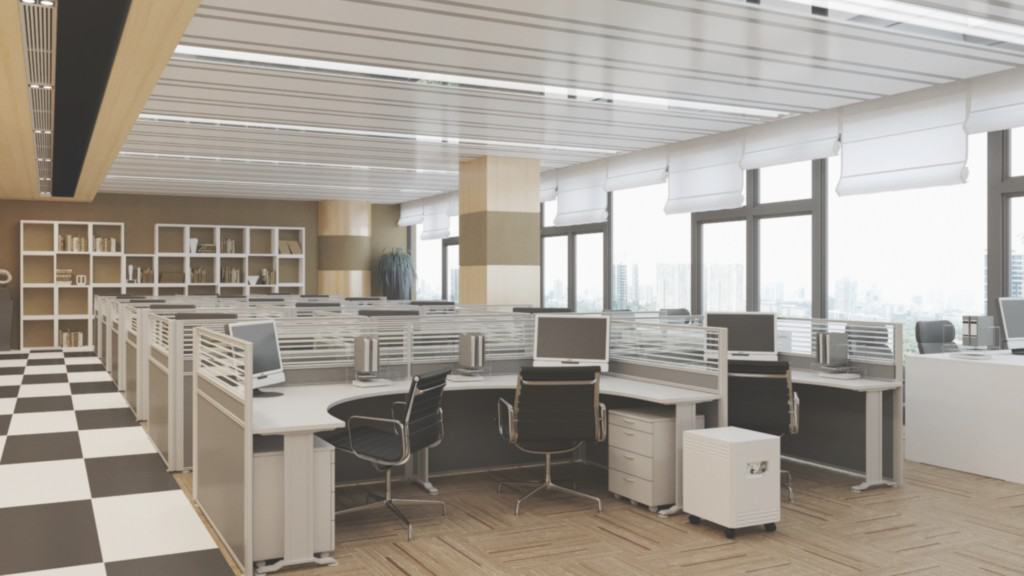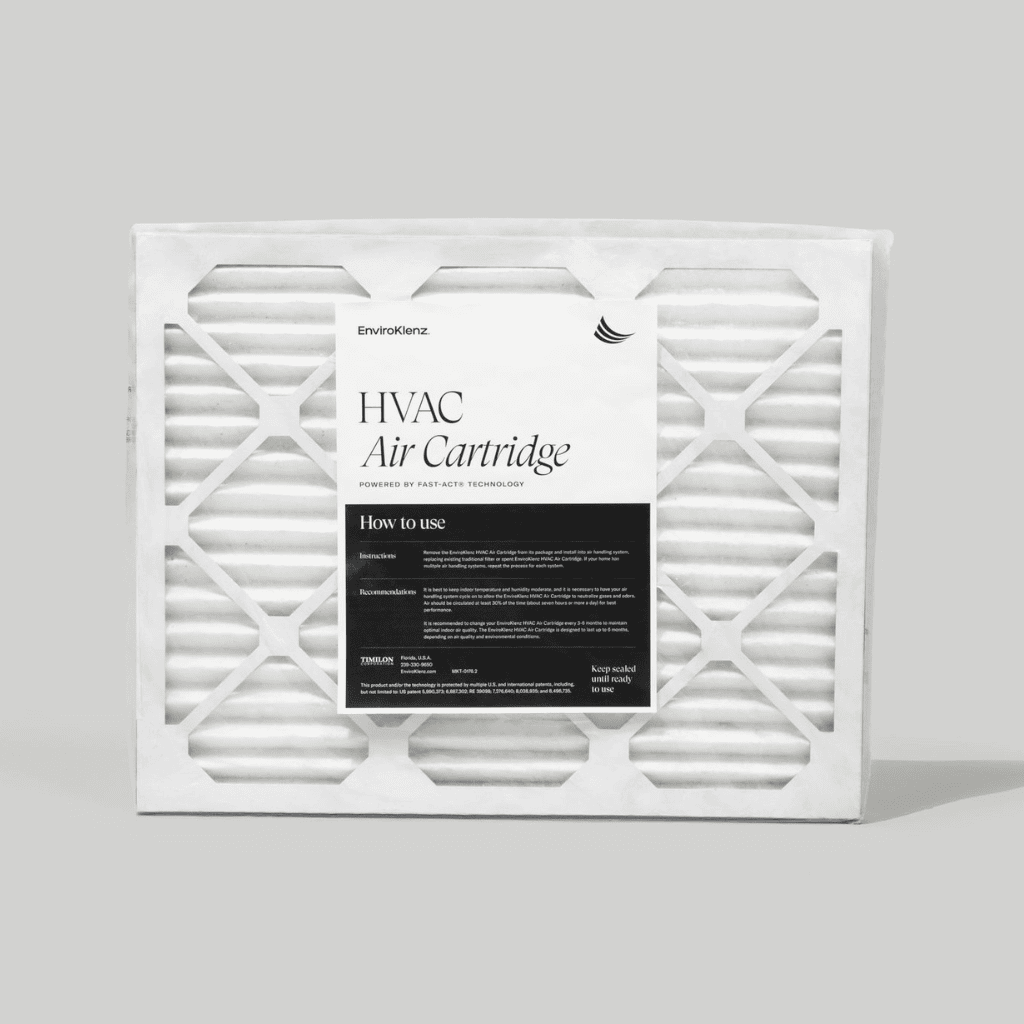A home is constantly pushing out air and re-circulating this air throughout the space, often times with little to no ventilation to replace the air with that of outside air. Today, homes are being built with efficiency in mind, and that includes constructing tighter homes to decrease energy consumption which in turn will lead to a depletion in air ventilation within the indoor environment. This new component to home’s draws increasingly more attention to the need of a high-quality HVAC air filter inside the air handling system to effectively trap and remove contaminants that can be in constant circulation throughout the indoor air.
Unfortunately, a home’s air filter is often among one of the most forgotten appliances in a home to clean and replace, which ultimately helps to maintain optimal function and effectiveness. Many will blame this minor upkeep of their HVAC units and the filters housed in them to simple forgetfulness, especially since many cheaper air filters that can be used in a home need to be changed out very frequently – almost once a month! The subsequent consequences of improper maintenance of your home’s air filter can lead to a slippery slope of problems for both your air handling system and the air quality within your personal indoor environment.
In this article, we are going to discuss everything you should know about your home’s air filter including the different types of air filter, how often they need to be changed out, and even conclude what is the best air filter to use inside of your home.
What is an Air Filter in Home
An HVAC air filter or furnace filter is designed to filter the air only when the system is operating and will push the air in the enclosed space through the filter to trap pollutants and contaminants floating in the air. These types of filters for homes are usually designed to filter particles like dust, hair particles, and other allergens that can be found floating in the air of the home.
These HVAC air filters are usually made of a spun fiberglass material, pleated paper, or cloth enclosed in a cardboard frame. The filtration process of these filters occurs when the airborne pollutants enter into the air handling system and are confronted with the filter media of the HVAC air filter. The filter media will take hold of the pollutants, trapping them in the filter and eliminating the pollutants from the air in this environment.
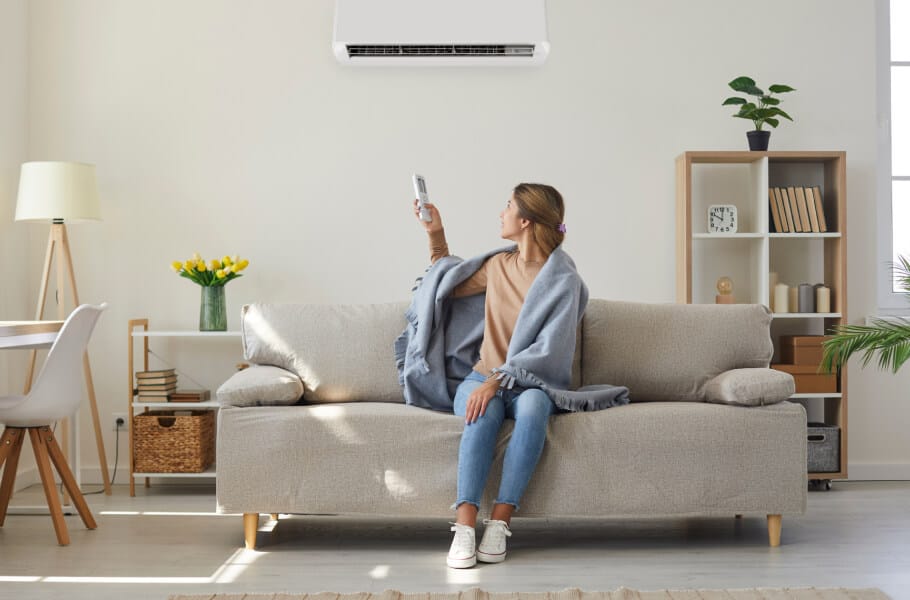
Do Air Filters Work?
When it comes to the different air filters that are manufactured for use in a standard air handling system, not all of these filters will work the same and filter the air of contaminants to contribute to good indoor air quality within the environment. Air filters, depending on the filter, will contain specific capabilities based on the designated MERV rating that each filter is labeled. MERV rating identifies a filters efficiency and performance when placed inside of an air handling system in a home.
MERV ratings range from 1 to 16, and these ratings represent the effectiveness of the filter when removing materials from the air. The higher the MERV rating the better the filtration of the air in which the air filter is covering.
A general guideline to MERV rating efficiency will show below:
- MERV 1-4: These filters are the most commonly found in homes and are considered standard filters. The filters with these MERV ratings will provide a basic level of filtration but at a lower, manageable cost.
- MERV 5-8: An adequate filter that provide good filtration, these types of filters are commonly found in residential environments. The material of these filters will include pleated cloth or paper to provide a larger surface for capturing particles.
- MERV 9-12: A high-quality filter that provides the capability to capture very small particles in the air, usually 1 micron or larger.
- MERV 13-16: The highest-quality air filter for your air handling system. These are considered the best-of-the-best and offer the ability to remove very small particles from the air such as 0.3 microns or larger.
What Does an Air Filter Do
There are many different functions that an air filter contributes to in an indoor environment. Typically, the function that we are most familiar with is the ability to filter out airborne particulate matter from the air of the enclosed environment, which is vitally important to trying to maintain good indoor air quality. However, there are additional functions that an air filter provides to a personal indoor environment such as protecting the air handling system and equipment from becoming damaged or ineffective in a home.
Air filters work like a shield inside of your air handling system to protect the HVAC equipment. The air filter will work to capture both the smaller and larger contaminants from the air, blocking them from entering into the equipment and tarnishing the effectiveness of the air handling system in the home. This can lead to the blocking of the fan and will lead to more frequent maintenance needed from air handling services.
How Often Should I Service My Air Conditioner
When it comes to your air handling system and having it serviced, it is recommended that this service be performed once a year. If, however, you neglect to frequently change out your air filter as needed, your air handling services may need to be performed more than the once a year recommendation. As your air handling system runs throughout the days, it will begin to accumulate dust and other debris in areas within the system that are key areas to maintain efficiency such as the coils and air filters. When these areas fill up with dirt and debris it will significantly impact the functioning of your air handling system.
A general maintenance service call from an A/C company will range in price between $70 and $100. This maintenance will include cleaning and servicing your HVAC unit, along with replacing your air filter.
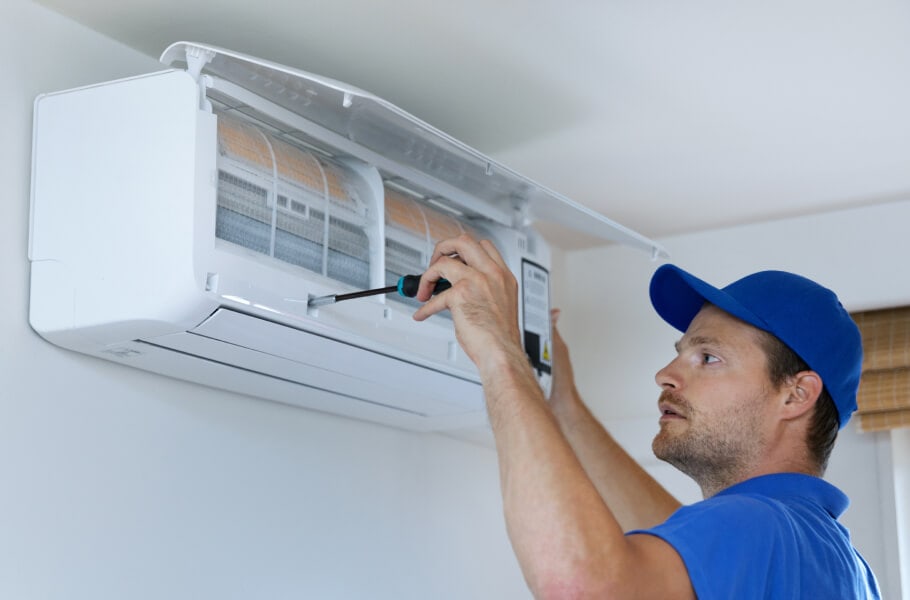
How Often Should You Change Your Air Conditioner Filter
The life of your home’s air conditioning filter can depend on a number of different variables including the material of the filter, the quality of the filter, and even the price of the filter can give you a general gauge on the life span of the filter. Less expensive, fiberglass filters will typically last a household around 30 days, whereas high-end pleated filters can last a household for up to 6 months.
The condition of the indoor environment will also impact the overall life of the air filter housed inside of your air conditioning system. These environmental conditions that can increase the number of replacements needed within a year can include the number of occupants inside the home, if there are pets present, and how often a deep cleaning is conducted in this personal indoor environment.
Home Air Filter Replacement Costs
If you are a homeowner than you are aware of the alarming replacement costs that you can incur from regularly replacing your home’s air filters. The cost, let alone from replacing air filters in a home, can be a contributing factor to neglect that sometimes occurs to a home’s air handling system in this environment. However, the less you replace your air conditioning systems filter, the more it can cost you in the long run when your system begins to experience issues from the dust and debris buildup inside of the equipment in the air handling system. Therefore, it may be beneficial to opt for a higher-quality air filter inside of your home that will last longer, minimizing replacement costs, as well as provide a higher efficiency to remove contaminants from the indoor air.
Types of Air Filters for HVAC Systems
Selecting an air filter for your home’s HVAC system can be a difficult decision, as there are many pros and cons to each type of air filters available to consumers. There are a variety of different types of filters including fiberglass, electrostatic, and pleated filters that can all vary in capabilities, price, and overall quality.
Below we are going to compare these three different air filters and conclude the pros and cons of these air filters inside of a home’s air handling system.
- Fiberglass Filters: The most common type of HVAC air filter, fiberglass filters are crafted from strands of fiberglass spun together. This filter is designed to trap large airborne particles, including dust from the air – helping improve the indoor air quality and protect the air handling system from a buildup of pollutants that can break down the effectiveness of this device. Fiberglass filters are disposable and inexpensive, but they truly lack the effectiveness to capture particulate matter, especially smaller particles found in the air.
- Pleated Filters: An upgrade from fiberglass filters, pleated filters work to prevent dust from entering into the HVAC system while also trapping airborne particles and allergens like pet dander and dust mites. These filters are built tighter than fiberglass filters, making the air conditioning system work harder to pull air through the unit. Although a pleated filter will work to improve the air quality within this environment, ultimately your HVAC system will lose some efficiency when pleated filters are used in the air handling system.
- Electrostatic Filters: Electrostatic filters are ideal to combat and remove allergens from the indoor air. This filter uses small cotton and paper fibers to generate a static charge when in use inside of an air handling system. The charge from this filter attracts the smallest airborne particles like a magnet, working to stop them from circulating throughout the personal indoor environment. This type of filter is more expensive than both fiberglass and pleated filters.
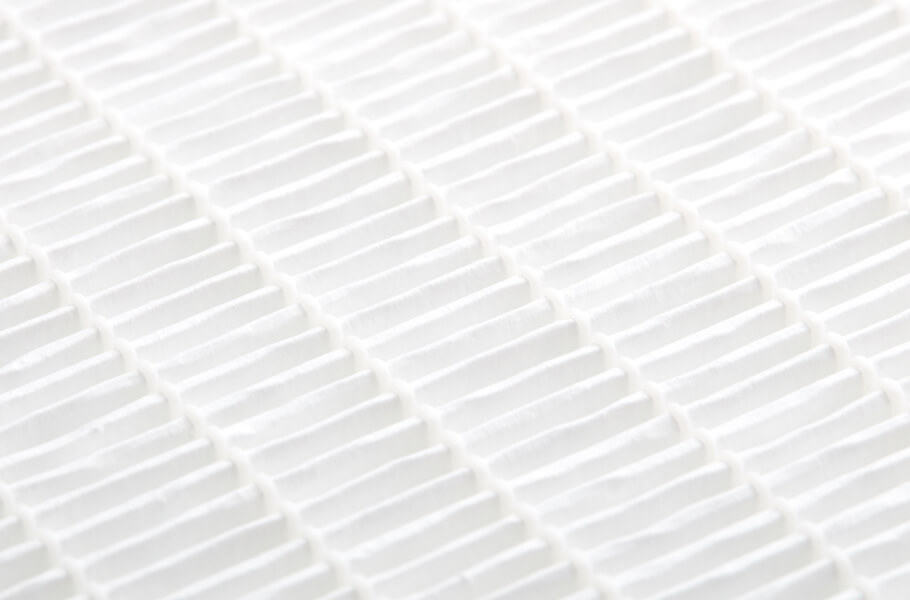
What is the Best Air Filter for Home A/C Units
When it comes down to selecting the best air filter to place inside of your home, there are many different factors to consider including the number of occupants inside of the home, how many pets are housed in the home, and the size of the home – these can all play a role in the life span and needed quality of an air filter inside of this environment. People and pets can add a number of pollutants into an environment that will travel throughout the airspace and end up trapped on the HVAC filter inside of your home. However, the more and more that you are present in this environment and releasing pollutants into the air (such as dirt, debris, pet dander, hair, dust, etc.) the quicker your filter will fill up and result in a blocked air handling system, restricted air flow, and compromised air quality within this indoor space.
The EnviroKlenz HVAC Filter is unlike the typical run-of-the-mill air filter that is designed only to remove particulate matter like dust and dander from your indoor air. EnviroKlenz filters are made with a proprietary earth mineral technology that was designed to capture and destroy harmful compounds and odors that would otherwise aggravate your sensitivities that traditional particulate matter filters are unable to capture. This filter does not contain masking agents or release any chemicals into the air – instead it is a safe and effective choice for eliminating a broad spectrum of airborne pollutants including allergens, noxious odors, and chemicals from the indoor air. Best of all, these filters will last in a home for up to 6 months of use – as it will continue to work aggressively to break down and neutralize the airborne pollutants that come into contact with the filter media.
